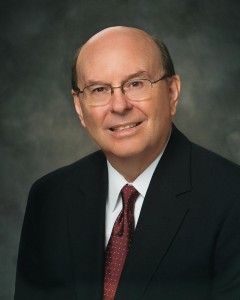
Elder Quentin L. Cook of the Quorum of the Twelve gave three ways in which the saints can prepare for the changing tides of life.
He opened his address by talking about his mission in the Bristol District, located in the United Kingdom. There, Elder Cook’s mission president would tell the missionaries to be “shipshape and Bristol fashion.”
The future member of the Quorum of the Twelve did not understand the saying until he learned about the history of the Bristol Port.
The port had a high tidal range of 43-feet, but during the low tides, the ships docked in the port would hit the bottom of the port and fall on their sides. If the ships were not built well and their contents tied down, both the items and the ships would become damaged during the low tides. Thus, the phrase “shipshape and Bristol fashion.”
“This same challenge is applicable to each of us. I would describe being ‘shipshape and Bristol fashion’ as being temple worthy in good times and in bad times.”
Elder Cook said that while the changes in water level are somewhat predictable in the Bristol Channel, storms and temptations in life vary.
He then described how happiness is interconnected to righteousness and that Christ has established standards of conduct to follow to become righteous. However, we are still expected to prepare for difficult times.
Aside from being temple worthy, Elder Cook gave three principles that can help contribute to righteousness.
The first is righteous self-control and conduct.
“I believe that sometimes our loving Father in Heaven must view us with the amusement we feel when we watch our own small children as they learn to grow. We all stumble and fall as we gain experience.”
Elder Cook then recalled the marshmallow experiment conducted by Stanford University, where children were told they could have a second marshmallow if they waited 15 to 20 minutes to eat the one already set in front of them.
While there were a variety of tactics that the children used to avoid eating the marshmallow, some were unable to succeed, he explained.
Elder Cook then described how Dr. Walter Mischel, the professor in charge of creating the Stanford experiment, wrote that “self-control is like a muscle: the more you use it, the stronger it gets.”
Elder Cook said that the same principle applies to both spiritual and temporal matters.
The second principle Elder Cook gave is honoring the Sabbath.
“For members of the Church of Jesus Christ of Latter-day Saints, honoring the Sabbath is a form of righteousness that will bless and strengthen families, connect us with our creator and increase happiness.”
He then described that within the last six months, there has been change in the church because of the emphasis on keeping the Sabbath. He described the change as a sign of devotion to Heavenly Father and that the members can continue to improve this practice.
The third principle given was that divine protections are provided us when we are righteous.
“As part of God’s divine plan, we are blessed with the gift of the Holy Ghost.”
Elder Cook explained that the companionship of the Holy Ghost is only a right when we are worthy and that the Holy Ghost could serve as a voice against evil, a cleansing agent and a protecting agent.
He also described that the Spirit is necessary to navigate the seas of life and that fruits of the Spirit are love, joy, peace, longsuffering, gentleness, goodness and faith.
Elder Cook concluded by saying that living a temple-worthy life will hold everything together as the tides go in and out of the harbor of life.




